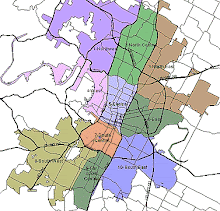 Austin is developing a comprehensive plan for the first time in thirty years, which already allows a multitude of challenges. One of the main challenges is that many people are not participating in city policies, but the vocal minority continues to speak for the city's citizens. I went to a meeting on to discuss how to address this, and met so many people who really want to change how Austin is working. Several ideas were presented, but these ideas struck a particular cord with me.
Austin is developing a comprehensive plan for the first time in thirty years, which already allows a multitude of challenges. One of the main challenges is that many people are not participating in city policies, but the vocal minority continues to speak for the city's citizens. I went to a meeting on to discuss how to address this, and met so many people who really want to change how Austin is working. Several ideas were presented, but these ideas struck a particular cord with me.To change current public participation, many people strongly advocate meetings in multiple places, because Austin has grown beyond the capabilities of getting downtown by 6pm. Also, people have families, and providing childcare sends the message that the City of Austin is not just for young, single people who work downtown, but the hundreds of families who have resided here for years. Austin has been pro-family, and should continue to represent that image. Technology which allows people to view meetings in live time is excellent, but input could be much more effective with actually allowing people to send messages to a monitored discussion board on a consistent basis. Finally, one particularly intelligent person from London recommended that the city develop a paid internship program for students from junior high through graduate school to participate in planning policies. A shoot-off of this conversation that is found with yet another advocate group, Transition Austin: http://www.transitionaustin.org/
The reality is that people care how the city works, and fortunately, many more people are talking about how to participate and when to participate, making the public input much more important. We can no longer be ruled by the politics and the mentalities of previous decades, and it is important for the next generation of participants to step up, as well as the previous participants to delegate. Our city can go in many directions, and we have to make sure that we get people communicating with each other rather than communicating for each other.
